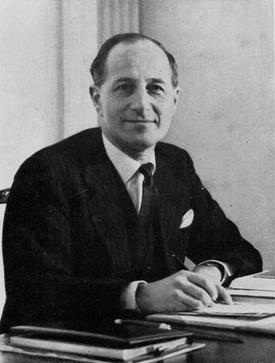 Captain Terence O'Neill
Captain Terence O'NeillKevin Meagher looks back at one of the key players in the history of 20th century Northern Ireland, Captain Terence O’Neill, and how in end his efforts towards a more equitable society, however well meaning, foundered badly
TERENCE O’Neill reminds us that good intentions are never enough
What was the point at which events in the late 1960s in Northern Ireland spiralled out of control?
When, if different decisions had been made — if people in charge had been bolder, or wiser — things might have turned out differently?
I found myself asking these questions over and over as I wrote my book, What A Bloody Awful Country: Northern Ireland’s Century of Division a couple of years ago, to coincide with the centenary.
I kept coming back to one man and one specific period.
Terence O’Neill, the unionist prime minister of Northern Ireland. He was elected in March 1963, before the Troubles broke out, but by which point tensions were already building beneath the rotten Orange state.
Since partition in 1921, Catholics had faced fifty years of appalling, state-sponsored discrimination.
The place was built as a unionist fief and Catholics were expected to know their place – which was, invariably, at the bottom of the pile.
Borrowing Kennedy’s famous line that ‘a rising tide lifts all boats,’ O’Neill tried to throw the focus on modernising Northern Ireland’s moribund economy. Improving living standards for all might help bridge the near impossible divide.
On one side, legitimate Catholic grievances about unionist abuses of power that saw rampant discrimination in jobs, housing and electoral boundaries. On the other, his own side’s unjustified sense of entitlement at presiding over this state of affairs as a birthright.
The allocation of social housing, run by corrupt unionist councils, discriminated against Catholic families. Electoral boundaries and the voting system were gerrymandered to lock-in unionist control. Protestant business owners openly discriminated against Catholics because of their names or where they lived.
The Royal Ulster Constabulary and its part-time division, the so-called ‘B-Specials,’ served as a militia for the Unionist government at Stormont. They could also call upon the Special Powers Act, granting them draconian measures, to keep things in line.
But the more I researched O’Neill and that period, the more sympathy I started to feel for him.
He was hemmed in on all sides. Radical reform was needed to make Northern Ireland even barely habitable for Catholics, but O’Neill, a patrician One Nation Tory, who was born in Knightsbridge in central London, was a fish out of water.
The Ulster Unionists started to resent what they took as his condescending attitude towards them. Nationalists saw him (justifiably) as all talk and no action. While Ian Paisley and his mob castigated any hint of reform, likening O’Neill to a bridge. They both crossed over to the other side.
Perhaps O’Neill’s signature gesture was to try and normalise relations with Dublin. In 1965, he invited Taoiseach Sean Lemass to Belfast — the first time that an Irish premier had ever set foot in Northern Ireland.
O’Neill pondered how he was going to welcome the Taoiseach when he arrived at Stormont. “Welcome to Ulster” might “rub salt into the wound” he wrote in his autobiography. While “Welcome to Northern Ireland” might seem like “troublemaking”. So, with commendable tact, he greeted Lemass with, “Welcome to the North.”
Can you imagine Arlene Foster being so gracious?
Now, I don’t want to overstate things: O’Neill was in charge and ultimately responsible; but he was also embarrassed by the petty sectarianism of his fellow unionists and was trying – albeit too slowly – to challenge them.
Anyway, to cut a long story short, this month is the 60th anniversary of Terence O’Neill becoming Northern Ireland’s prime minister. Between 1963 and 1969 when he was ousted by his party, Northern Ireland sunk into the abyss.
Those five or so years were critical but no one did enough to avert the catastrophe that was to come.
O’Neill talked the game but couldn’t bring his party with him to deliver basic reforms that were crying out to be made. If they had been, the Troubles might have been avoided.
For the most part, Westminster was oblivious. Members of Parliament could not even ask questions on the floor of the House of Commons about Northern Ireland as it was a ‘reserved matter.’
Eventually Harold Wilson’s Labour government intervened, making the fateful decision to send-in the troops to quell rampaging loyalist mobs that had been stirred-up by Paisley.
Writing his memoirs in 1971, O’Neill expressed his “personal sorrow” that his efforts at modest reform had been “wrecked by wicked men”. He was, of course, referring to Paisley.
It’s a sorry tale, but Terence O’Neill’s example reminds us that we should always demand greater boldness from our politicians.
Good intentions are simply never enough.
 Kevin Meagher
Kevin MeagherKevin Meagher is author of A United Ireland: Why Unification is Inevitable and How it will Come About and What A Bloody Awful Country: Northern Ireland’s Century of Division

